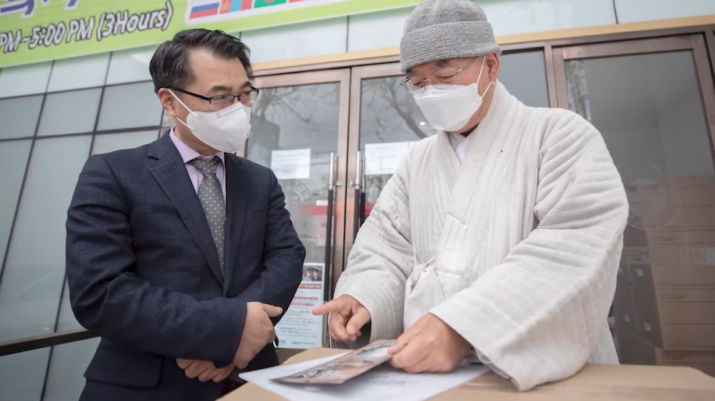NEWS
Korean Zen Master Pomnyun Sunim Offers Buddhist Guidance for Coping with the Pandemic

The venerable Korean Seon (Zen) master Pomnyun Sunim* on Monday shared a Buddhist message of hope, acceptance, and resilience for a world grappling with fear and uncertainty. As the COVID-19 pandemic brings entire countries to a halt, damaging lives and livelihoods, and threatening societies and communities around the world, the renowned monk offered a Dharma-based perspective on embracing change and moving forward into a new reality.
“As we watch the COVID-19 pandemic unfold, we can somewhat foresee how our society might change over time,” Pomnyun Sunim said in an address given in Seoul last week. “The pandemic has disrupted our daily lives. We think that set programs and agreed upon schedules must be followed, but there is no such rule. Right now we have no choice but to alter them. We are shocked by our broken routines, so we experience chaos, suffering, and struggle.
“However, consider the Buddha’s teaching of impermanence. We should always keep in mind that nothing is permanent. Only then can we see that changes in our daily lives are not that bad, so long as we can face and adapt to them.”
A widely respected author, Dharma teacher, and social activist in his native South Korea, Pomnyun Sunim has founded numerous organizations, initiatives, and projects that are active across the world. Among them, Jungto Society, a volunteer-based community founded on the Buddhist teachings and expressing equality, simple living, and sustainability, is dedicated to addressing modern social issues that lead to suffering, including environmental degradation, poverty, and conflict. Join Together Society, an international aid organization, works to eradicate poverty and hunger through humanitarian relief and sustainable development. Pomnyun Sunim also works closely with the Thailand-based International Network of Engaged Buddhists (INEB).
“We should make the best of the situation in a way that works for us. Regarding COVID-19, the most pressing concern is our safety. We must focus on protecting ourselves from the virus,” Sunim explained. “We must also prevent any substantial losses. But if we cannot avoid the loss, we must act proactively to minimize the loss. To make this possible, we need to overcome our fear of uncertainty.
“Practice is not limited to bows or meditation. Practice is seeing things as they are. If we can see the true reality and nature of things and respond appropriately, we can free ourselves from fear and resentment. This is the essence of practice.”
After experiencing an early surge in COVID-19 infections as the coronavirus began spreading from China, South Korea, has since become one of the most successful countries in its efforts to contain the outbreak within its borders. While the pandemic continues to spread exponentially in some parts of the world, Korea has reported a decline in the growth of new cases since early March, a success the government has attributed to a strategy dubbed TRUST: transparency, robust screening and quarantine, unique but universally applicable testing, and strict control and treatment.
Within weeks of the first confirmed case being reported in the country, the government acted quickly to develop a test kit for COVID-19. Since then, some 100,000 test kits per day have been produced, and 600 testing sites set up—including drive-through centers, where people can be tested without leaving their cars. Patients are typically informed of their test results by text message within hours. As a result, the fatality rate in Korea has been relatively low, businesses have largely been able to continue operating, and no cities have been locked down.
At the time of writing on 1 April, global SARS-CoV-2 coronavirus infections were reported to total 861,305, with 42,365 deaths so far confirmed, and 178,718 recovered.** The World Health Organization has previously estimated the mortality rate from the virus at 3.4 per cent, based on preliminary data, with the elderly and people with underlying health conditions considered most at risk. South Korea has reported 9,887 confirmed infections, with 165 fatalities and 5,567 recovered.
* Sunim is a Korean title of respect for senior Buddhist monks.
See more
Pomnyun
정토회
Jungto Society
JTS International
JTS Korea
JTS America
A Casual Conversation with a Zen Master (YouTube)
International Network of Engaged Buddhists
In Depth: Why South Korea is winning the coronavirus battle (Nikkei Asian Review)
Related news from Buddhistdoor Global
Appeal for COVID-19 Emergency Relief for Vulnerable Communities in India
A Message from Kyabgön Phakchok Rinpoche on the Coronavirus Pandemic
Buddhist Organizations in North America Offer Online Retreats and Programs in Response to Social Distancing
Senior Thai Monk Offers a Buddhist Perspective on Dealing with COVID-19
Buddhism Classes among those Freely Available Online as Coronavirus Leaves Many at Home
Related features from Buddhistdoor Global
Let there Be Loss
Buddhistdoor View: Remembering the Basics of Buddhist Practice as we Imagine our Future
Buddhistdoor View: Steady as She Goes – Compassionate Responses to Global Panics
Buddhistdoor View: Embracing Fear and Uncertainty














